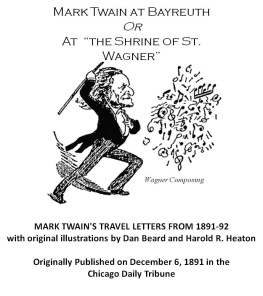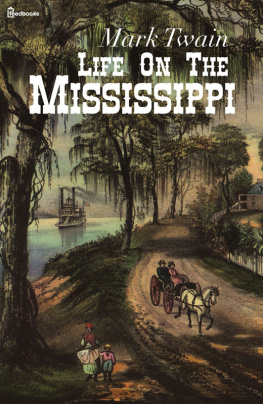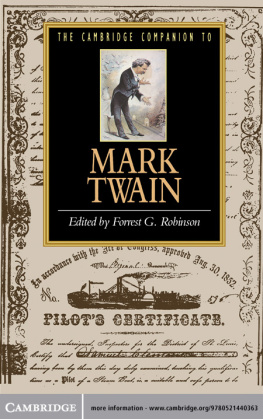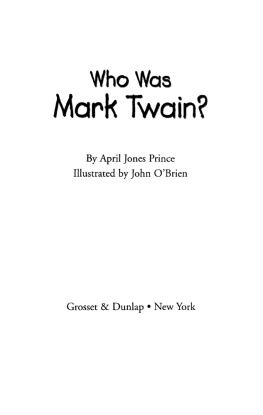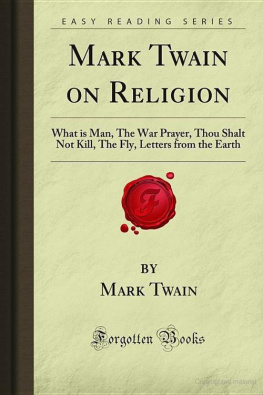Mark Twain - Mark Twain at Bayreuth or: at the Shrine of St. Wagner
Here you can read online Mark Twain - Mark Twain at Bayreuth or: at the Shrine of St. Wagner full text of the book (entire story) in english for free. Download pdf and epub, get meaning, cover and reviews about this ebook. genre: Detective and thriller. Description of the work, (preface) as well as reviews are available. Best literature library LitArk.com created for fans of good reading and offers a wide selection of genres:
Romance novel
Science fiction
Adventure
Detective
Science
History
Home and family
Prose
Art
Politics
Computer
Non-fiction
Religion
Business
Children
Humor
Choose a favorite category and find really read worthwhile books. Enjoy immersion in the world of imagination, feel the emotions of the characters or learn something new for yourself, make an fascinating discovery.
- Book:Mark Twain at Bayreuth or: at the Shrine of St. Wagner
- Author:
- Genre:
- Rating:4 / 5
- Favourites:Add to favourites
- Your mark:
- 80
- 1
- 2
- 3
- 4
- 5
Mark Twain at Bayreuth or: at the Shrine of St. Wagner: summary, description and annotation
We offer to read an annotation, description, summary or preface (depends on what the author of the book "Mark Twain at Bayreuth or: at the Shrine of St. Wagner" wrote himself). If you haven't found the necessary information about the book — write in the comments, we will try to find it.
Mark Twain at Bayreuth or: at the Shrine of St. Wagner — read online for free the complete book (whole text) full work
Below is the text of the book, divided by pages. System saving the place of the last page read, allows you to conveniently read the book "Mark Twain at Bayreuth or: at the Shrine of St. Wagner" online for free, without having to search again every time where you left off. Put a bookmark, and you can go to the page where you finished reading at any time.
Font size:
Interval:
Bookmark:
with original illustrations by Dan Beard and Harold R. Heaton
Chicago DailyTribune, December 6, 1891

MARK TWAIN ATBAYREUTH
[Oftenretitled "At the Shrine of St. Wagner"]
It was atNuremberg that we struck the inundation of music-mad strangers that was rollingdown upon Bayreuth. It had been long since we had seen such multitudes ofexcited and struggling people. It took a good half-hour to pack them and pairthem into the train--and it was the longest train we have yet seen in Europe.Nuremberg had been witnessing this sort of experience a couple of times a dayfor about two weeks. It gives one an impressive sense of the magnitude of thisbiennial pilgrimage. For a pilgrimage is what it is. The devotees come from thevery ends of the earth to worship their prophet in his own Kaaba in his ownMecca.
If you areliving in New York or San Francisco or Chicago or anywhere else in America, andyou conclude, by the middle of May, that you would like to attend the Bayreuthopera two months and a half later, you must use the cable and get about itimmediately or you will get no seats, and you must cable for lodgings, too.Then if you are lucky you will get seats in the last row and lodgings in thefringe of the town. If you stop to write you will get nothing. There wereplenty of people in Nuremberg when we passed through who had come on pilgrimagewithout first securing seats and lodgings. They had found neither in Bayreuth;they had walked Bayreuth streets a while in sorrow, then had gone to Nurembergand found neither beds nor standing room, and had walked those quaint streetsall night, waiting for the hotels to open and empty their guests into trains, andso make room for these, their defeated brethren and sisters in the faith. Theyhad endured from thirty to forty hours' railroading on the continent ofEurope--with all which that implies of worry, fatigue, and financialimpoverishment--and all they had got and all they were to get for it washandiness and accuracy in kicking themselves, acquired by practice in the backstreets of the two towns when other people were in bed; for back they must goover that unspeakable journey with their pious mission unfulfilled. Thesehumiliated outcasts had the frowsy and unbrushed and apologetic look of wetcats, and their eyes were glazed with drowsiness, their bodies were adroop fromcrown to sole, and all kind-hearted people refrained from asking them if theyhad been to Bayreuth and failed to connect, as knowing they would lie.
We reachedBayreuth about mid-afternoon of a rainy Saturday. We were of the wise, and hadsecured lodgings and opera seats months in advance.
I am not amusical critic, and did not come here to write essays about the operas anddeliver judgment upon their merits. The little children of Bayreuth could dothat with a finer sympathy and a broader intelligence than I. I only care tobring four or five pilgrims to the operas, pilgrims able to appreciate them andenjoy them. What I write about the performance to put in my odd time would beoffered to the public as merely a cat's view of a king, and not of didacticvalue.

THEBAYREUTH THEATER
Next day, whichwas Sunday, we left for the opera-house--that is to say, the Wagner temple--alittle after the middle of the afternoon. The great building stands all byitself, grand and lonely, on a high ground outside the town. We were warnedthat if we arrived after 4 o'clock we should be obliged to pay $2.50 apiece byway of fine. We saved that; and it may be remarked here that this is the onlyopportunity that Europe offers of saving money. There was a big crowd in thegrounds about the building, and the ladies' dresses took the sun with fineeffect. I do not mean to intimate that the ladies were in full dress, for thatwas not so. The dresses were pretty, but neither sex was in evening dress.
The interior ofthe building is simple--severely so; but there is no occasion for color anddecoration, since the people sit in the dark. The auditorium has the shape of akeystone, with the stage at the narrow end. There is an aisle on each side, butno aisle in the body of the house. Each row of seats extends in an unbrokencurve from one side of the house to the other. There are seven entrance doorson each side of the theater and four at the butt end--eighteen doors to admitand emit 1,650 persons. The number of the particular door by which you are toenter the house or leave it is printed on your ticket, and you can use no doorbut that one. Thus, crowding and confusion are impossible. Not so many as ahundred people use any one door. This is better than having the usual (anduseless) elaborate fireproof arrangements. It is the model theater of theworld. It can be emptied while the second hand of a watch makes its circuit. Itwould be entirely safe, even if it were built of lucifer matches.
If your seat isnear the center of a row and you enter late you must work your way along a rankof about twenty-five ladies and gentlemen to get to it. Yet this causes notrouble, for everybody stands up until all the seats are full, and the fillingis accomplished in a very few minutes. Then all sit down, and you have a solid massof fifteen hundred heads, making a steep cellar-door slant from the rear of thehouse down to the stage.
All the lightswere turned low, so low that the congregation sat in a deep and solemn gloom.The funereal rustling of dresses and the low buzz of conversation began to dieswiftly down, and presently not the ghost of a sound was left. This profoundand increasingly impressive stillness endured for some time--the bestpreparation for music, spectacle, or speech conceivable. I should think ourshow people would have invented or imported that simple and impressive devicefor securing and solidifying the attention of an audience long ago; instead ofwhich there continue to this day to open a performance against a deadlycompetition in the form of noise, confusion, and a scattered interest.
|
Finally, out ofdarkness and distance and mystery soft rich notes rose upon the stillness, andfrom his grave the dead magician began to weave his spells about hisdisciplesand steep their souls in his enchantments. There was something strangelyimpressive in the fancy which kept intruding itself that the composer wasconscious in his grave of what was going on here, and that these divine soulswere the clothing of thoughts which were at this moment passing through hisbrain, and not recognized and familiar ones which had issued from it at someformer time.
The entireoverture, long as it was, was played to a dark house with the curtain down. Itwas exquisite; it was delicious. But straightway thereafter, or course, camethe singing, and it does seem to me that nothing can make a Wagner operaabsolutely perfect and satisfactory to the untutored but to leave out the vocalparts. I wish I could see a Wagner opera done in pantomime once. Then one wouldhave the lovely orchestration unvexed to listen to and bathe his spirit in, andthe bewildering beautiful scenery to intoxicate his eyes with, and the dumbacting couldn't mar these pleasures, because there isn't often anything in theWagner opera that one would call by such a violent name as acting; as a ruleall you would see would be a couple of silent people, one of them standingstill, the other catching flies. Of course I do not really mean that he wouldbe catching flies; I only mean that the usual operatic gestures which consistin reaching first one hand out into the air and then the other might suggestthe sport I speak of if the operator attended strictly to business and utteredno sound.
Font size:
Interval:
Bookmark:
Similar books «Mark Twain at Bayreuth or: at the Shrine of St. Wagner»
Look at similar books to Mark Twain at Bayreuth or: at the Shrine of St. Wagner. We have selected literature similar in name and meaning in the hope of providing readers with more options to find new, interesting, not yet read works.
Discussion, reviews of the book Mark Twain at Bayreuth or: at the Shrine of St. Wagner and just readers' own opinions. Leave your comments, write what you think about the work, its meaning or the main characters. Specify what exactly you liked and what you didn't like, and why you think so.

